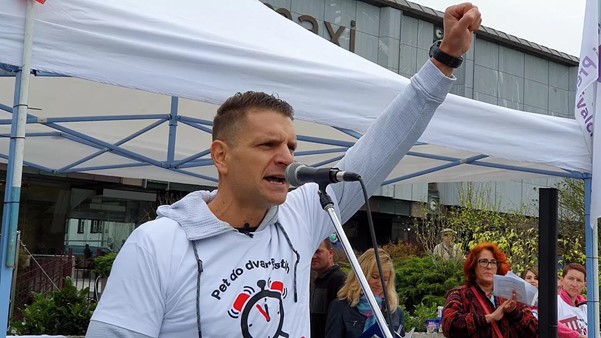On the 24th of December 2021, the Kranj District Prosecutor dismissed the criminal complaint against the president of the Resni.ca (the Truth) party, Zoran Stevanović, who was accused of inciting the uprisings. According to the Slovenian Press Agency, three people were detained on the 5th of October 2021, on suspicion of committing a crime, at a rally that turned violent. Two of them were Zlatan Čordić, who gave a speech at the rally before violence ensued, and Zoran Stevanović, who called for rallies, which were attended by masses of people who destroyed property and attacked police officers. Meanwhile, some members of the Styrian Guard (called “Štajerska varda” in Slovenian) were strictly prosecuted and even convicted and imprisoned.
The president of the Resni.ca party (the Truth), Zoran Stevanović, who actively called for participation in the Wednesdays’ unreported anti-government rallies in autumn, has already announced that he plans to sue the state after the Kranj District Prosecutor’s Office rejected a criminal complaint by the police against him, on suspicion of inciting insurgency. Namely, Stevanović believes that his detention was illegal.
ON the 6th of October 2021, a Nova24TV journalist Luka Svetina wrote the following on Twitter: “The claim that Zoran Stevanović missed the beginning of the rally at 3 p.m., is just another one of his lies. He was actually detained by police, who questioned him and told him that he would be arrested as soon as the protesters left the Republic Square.” According to Svetina, on Monday, before the protest, the police already asked the Prosecutor’s Office for an order to arrest Stevanović due to the danger of riots; however, that was then prevented by the head of the Ljubljana Prosecutor’s Office, Katarina Bergant. According to the police, violence then ensued during the protests, and Stevanović was arrested together with the other well-known provocateur, Zlatan Čordić. We reported on the injured police officers and the destroyed property after virtually every protest, and along with the Fridays’ protests, these riots caused more than 1.2 million euros in policing costs alone.
The prosecution is on the side of criminals
The Ljubljana Prosecutor’s Office, led by the aforementioned Bergant, has said in the past that the phrase “Death to Janšaism” is not problematic and that individuals who carry banners or shout these threats will not be prosecuted. Minister of the Interior Aleš Hojs got a similar answer after he filed a criminal complaint against Facebook user Alojz Breznik, who wrote that Hojs was “a dog who needs to be liquidated.”
Namely, District State Prosecutors Klementina Prejac rejected the complaint in February 2021 because it did not pose a “serious threat,” but instead, according to her, Breznik’s “comment reflected the suspect’s personal inner convictions regarding the Minister’s behaviour and, therefore, as such, in the time and place in which the suspect acted, cannot be considered a serious threat.”
However, things turned out differently at the Velenje District Court, where the accused Luka Štitić was found guilty of a criminal offence under the first paragraph of Article 135 of the Criminal Code and sentenced to a suspended sentence of two months in prison. Namely, on the 3rd of November 2020, Štitić threatened Prime Minister Janša with an “all-Slovenian uprising of the nation” on Facebook. He wrote: “… Janez should start shaking from fear when we stand in front of his house and start throwing Molotov cocktails at him through the windows… He will quickly think of the safety of his wife and children… Then, he will finally be willing to listen – but it will already be too late. WE SHOULD HANG JANŠA ON PREŠEREN SQUARE.” However, Štitić is still at large and will only be imprisoned if he commits a crime within a year of the conviction.
The judiciary that works on its own terms
All these cases clearly show that the courts do not have the same standard throughout Slovenia, but that it really depends on the court or the prosecutor assigned to an individual case, whether the death threats will be prosecuted or not. The same is true for the calls for uprisings. Andrej Šiško and his Styrian Guard were prosecuted, but Stevanović and his Resni.ca party were not. This time, it once again turned out that the wheels of law enforcement were driven by the media and politicians, who, in the case of Šiško, did everything in their power to ensure a conviction.
Peter Truden


